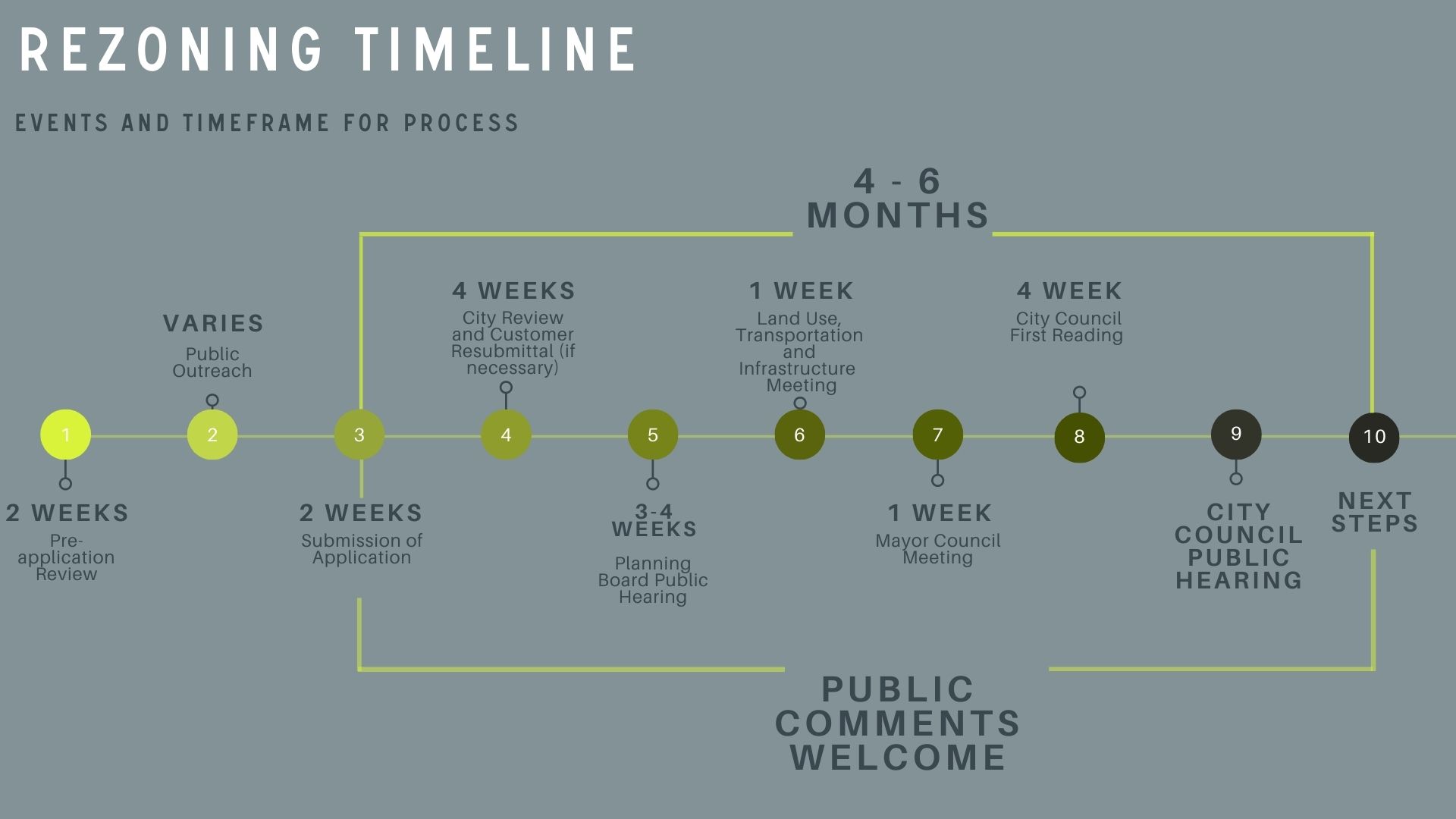Rezoning Process
If you are seeking to build an ADU but your zoning district currently doesn’t allow ADUs to be built, rezoning is the only option to proceed with. Sustainable Design Build can not navigate the rezoning process for you but we are more than familiar with how the process goes. We are happy to offer insight and possible connections to help you on your rezoning initiative. Rezoning approval can often take between 4 – 6 months and sometimes, even longer. To ensure the fastest route through the process, it’s important to have an experienced advocate on your side. Unique circumstances and/or rezoning complexity will adjust the time frame.

1. Pre-application Review
The first step to begin rezoning your home is by submitting a rezoning review request pre-application as well as schedule a pre-application review meeting with the City and County of Denver. A City Residential Construction Case Manager will be assigned to your project.
2. Public Outreach
For rezoning, it will be your responsibility as a homeowner to inform the surrounding neighborhood and community of your plans. This will often come in the form of certified letters to residents or holding a meeting with the city council. This provides residents to voice their concerns. The city will typically schedule this meeting/forum and you will have to be present.
3. Submission of Application
After, you will submit a complete, signed application in electronic format, a Microsoft Word document containing the legal description for the area proposed to be rezoned, and the required fee to CPD.
4. City Review and Resubmittal
Review Comments are often provided by various City agencies and departments who review the application. It is important to respond to all comments and recommendations and resubmit the revised application. Oftentimes, there can be more than one cycle of review and submittal.
5. Planning Board Public Hearing
The Residential Construction Case Manager will schedule the Planning Board public hearing date and notify the community. In addition, it is your responsibility to place visible signage about the hearing on your property. The city will have signs provided for you.
At the hearing, the Planning Board will make a recommendation to the City Council for approval, approval with conditions, or denial of the rezoning application. In some cases, the Board may hold the item and continue it to a later date for further discussion.
6. Land Use, Transportation and Infrastructure meeting
Next, the Land Use, Transportation & Infrastructure Committee will schedule a televised meeting and determine if the application is ready for full City Council consideration. The case manager will present the application, CPD recommendation, and Planning Board recommendation. In some cases, the Committee may accept public comments. The Committee will decide whether the application is ready for full City Council hearing and action. If so, the application will proceed.
7. Mayor-Council Meeting
The case manager will present the application to the Mayor and City Council.
8. City Council First Reading
At the City Council First Reading, City Council will read the ordinance to change the zoning and schedule the rezoning for a public hearing. City Council may postpone the public hearing to allow for further discussion.
9. City Council Public hearing
The City Council will hold a noticed and televised public hearing and approve, approve with conditions, or deny the rezoning application. The homeowner will notify the public once again along with a signed affidavit stating this was done correctly. The case manager will present the application, CPD recommendation, and recommendations from the Planning Board and Use, Transportation & Infrastructure Committee. The customer must attend the public hearing. If the customer would like to speak on their application, they must sign up with the clerk at the hearing. The applicant will get two minutes to speak. City Council will vote to approve, approve with conditions, or deny the application.
10. Next Steps
If the rezoning is approved or approved with conditions by City Council, it will be forwarded to the Mayor for signature. Once signed, the rezoning becomes effective the Thursday after the public hearing when the City Clerk publishes the adopted ordinance. The official zoning map will be updated to reflect the change within two weeks. If the rezoning is denied, City Council’s decision may be appealed to the Denver District Court.
A. If the rezoning is denied, another rezoning application for the same zoning district cannot be submitted until 12 months has passed from the City Council public hearing date.
B. If a rezoning application proposes a different zoning district, there is no minimum amount of time before an application can be submitted
Other helpful form:
Where to go from here
Now that you know a little more about the process and requirements for rezoning a home, you might be feeling a little overwhelmed. Do not worry! We have connections and resources that can help you navigate this process. Feel free to reach out to Sustainable Design Build to get more information about your property’s potential and information for rezoning.
Connect With Us
Planning your next renovation, or maybe you are looking to do a complete remodel for your home? Whatever the task, it can’t hurt to ask. Reach out to our team through this form.
We can schedule a free consultation and discuss everything you need to get your project moving in the right direction. Did we mention, it’s absolutely free?
No time like the present to get started on turning your house into the home of your dreams.
